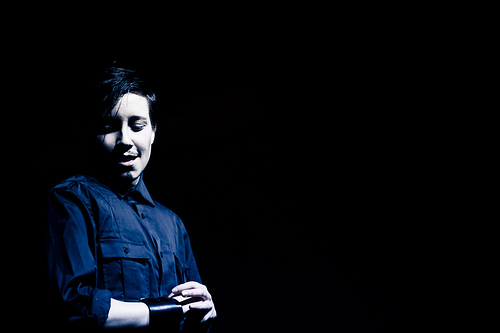
Source: Transformator Monolog Festival, Mathies Jespersen,
Flickr
First, you will learn about an actor talking to the audience, to an imaginary person, or to another actor who is just listening but not responding. These speeches are called monologues. Mono- is a prefix meaning “one” as in monorail, monocle, monopoly, monogamy, or monosyllable.
Monologues are big parts for an actor. These are the moments when a play belongs to one actor. In other words, when the actor comes to a monologue, he or she has to take a deep breath and say, “OK, here is the big scene. It’s my play for the next five minutes.”
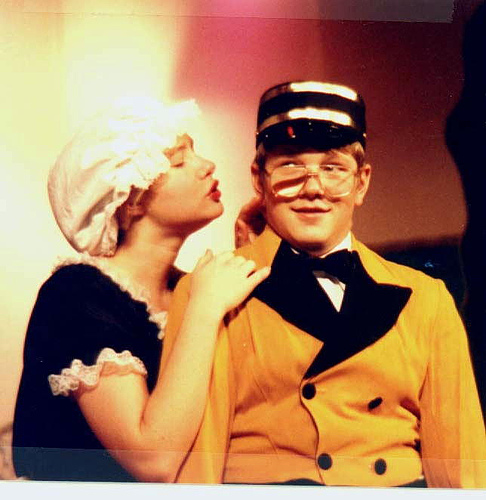
Source: Skin of Our Teeth 1993 by Thornton Wilder,
drurydrama, Flickr
Look at the first four minutes of a performance of Thorton Wilder’s The Skin of Our Teeth. In this play, Wilder experiments with several stage conventions, one of which is the monologue of exposition in which one character speaks to the audience and introduces the other characters in the play.
If you watch this clip beyond the first few minutes, you will see that the actress pretends to be ready for the next character to appear, only to find herself stuck onstage, forced to continue the monologue when the actor who is supposed to appear doesn’t. After attempting to restart the play, she “breaks character” and becomes an actress rather than a maid. She then sits down and confides to the audience that she hates the play. (This is all part of the script. Breaking character and breaking the fourth wall are additional conventions that Wilder is playing with.) Watch at least four minutes of the video and answer the questions that follow.
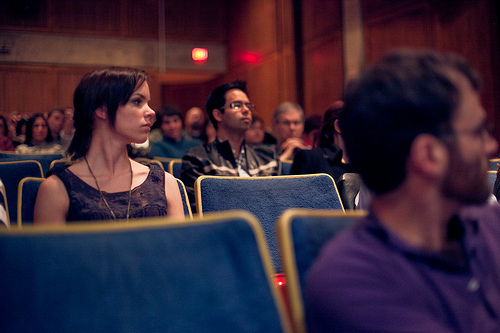
Source: the audience, Raffaella Loro, Flickr
Let’s think about the function of the monologue and how it adds to our enjoyment and understanding of the play. Try answering the following questions:

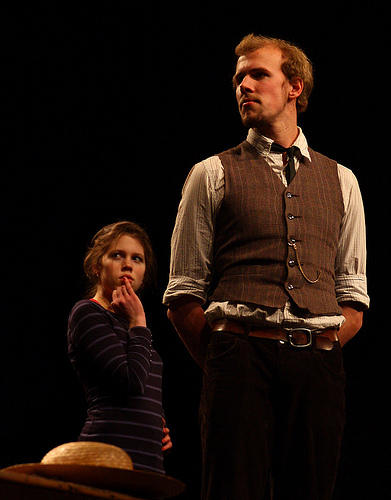
Source: IMG_1414, kjeik, Flickr
Sometimes a character will give a speech during a conversation with another character. This counts as a monologue because it is delivered with an assumption that no other character is going to interrupt. A monologue is, therefore, not part of a dialogue in which characters speak and listen to reactions from other characters and then speak again. In a monologue, the character speaks about something without waiting for, or wanting any response from, the other characters.
Look at the speech below by Algernon, a character in Oscar Wilde’s play The Importance of Being Ernest. In this scene, Algernon is telling his friend Jack why he is not going to have dinner with his Aunt Augusta. Jack has just said that Algernon had “better dine with Aunt Augusta.” Here is Algernon’s answer:
ALGERNON
I haven’t the smallest intention of doing anything of the kind. To begin with, I dined there on Monday, and once a week is quite enough to dine with one’s own relations. In the second place, whenever I do dine there I am always treated as a member of the family, and sent down with either no woman at all, or two. In the third place, I know perfectly well whom she will place me next to, tonight. She will place me next Mary Farquhar, who always flirts with her own husband across the dinner table. That is not very pleasant. Indeed, it is not even decent . . . and that sort of thing is enormously on the increase. The amount of women in London who flirt with their own husbands is perfectly scandalous. It looks so bad. It is simply washing one’s clean linen in public.
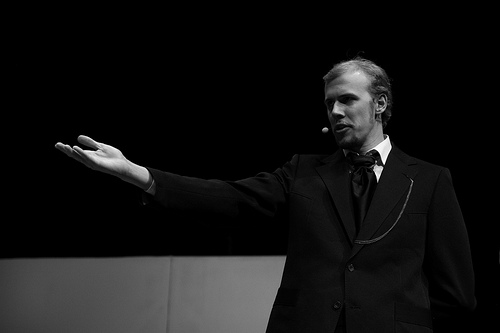
Source: IMG_1763, kjeik, Flickr
Monologues give us a chance to learn more about the views and ideas of the character delivering the monologue and often give us important context, or information about other characters or prior events.
Monologues are different from dialogues because they are uninterrupted speeches by single characters. They are also different from soliloquies, the topic of the next section.